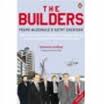 The Builders by Frank McDonald
and Kathy Sheridan
The Builders by Frank McDonald
and Kathy Sheridan
 The Builders by Frank McDonald
and Kathy Sheridan
The Builders by Frank McDonald
and Kathy Sheridan
Without a single map or chart, the authors recount the recent history of Ireland's land developers.
At a lavish charity lunch in a five-star hotel, one wealthy developer explained courteously tht his media aversion was about keeping his young children 'ordinary'. "I don't want tehm to know what they're worth. I don't want them reading about their money in the papers and I don't want their schoolfriends reading about it either." But in a functioning democracy, are such people entitled to demand and receive that level of privacy?
These men built up huge 'land banks', buying quite cheaply in the late 1980s and early 1990s and then salivating over the soaring values druing the boom that followed -- and all because successive governments had failed to implement the 1974 Kenny Report on building land, which recommended that all land designated for urban development should be compulsorily acquired by the local authorities ast its existing use value, plus a premium of 25 per cent.
In more recent years, as their fame and wealth have grown, many developers have switched their companies to unlimited status. this status means the liabilities of the companies, should they ever get into difficulty, are not limited to the assets fo the companies, but can extend to the assets of the owners. Unlimited companies do not have to file accounts with the CRO (Companies Registration Office), and this increased privvacy is undoubtedly attractive.
'Nobody wants to be the pioneer in the West who gets shot by the Indians. they wnt to be second -- that's the pole position'
"The only reason why Dublin remained for so long the beautiful 18th-century city the English bulit is that the Irish were too poor to pull it down. This, unfortunately, is no longer the case."
It was not until Magill published a 1989 letter from Bovale's Mick Bailey telling Gogarty that he could 'procure' a majority of Dublin County Council to support the rezoning of lands owned by JMSE that the government finally agreed to establish a tribunal of inquiry into allegations of planning corruption. That same month, October 1997, Burke resigned from the Dail, still insisting that he had done nothing wrong.
A Dundalk-born mechanical engineer (Liam Carroll) who worked for Jacobs International, he was bitten by teh peroperty bug in his early thirties when he bought a site, had a house built by subcontractors and reckoned that there was no great mystery to this property game. The really surprising thing is that he went on to become the main engine of urban renewal in Dublin, building more apartments in the inner city than all other developers combined....
Liam Carroll, their (Hooke and MacDonald) principal client, was making money hand over fist. he had a genius for site assembly. Every site he developed, usually in run-down areas where property could be acquired cheaply, was assembled by him personally, rather than at arm's length through agents, and he would often go back again and again to reluctant vendors until he clinched a deal. He knocked on doors himself, cut the deals himself, wrote the cheques himself. His administration, like everything else about him and his business, was and is famously sparse....
In an industry where stables of thoroughbreds, EUR 18 million choppers and private Girls Aloud gigs are standard kit for even the minnows, Carroll is a maverick, a puzzle wrapped in an enigma, a soft-spoken billionaire in blue jeans, woolly geansai and ageing Toyota saloon, trucking home to Mount Merrion every evening to the same ordinary, four-bed semi he moved into more than 20 years ago with his wife, Roisin, a former maths teacher, and their family of three.
"We'd have seen a good turn in the business in '95 and '96 and I just kept moving on, taking the collateral from one site to the next, getting mates in to help do it up, renting it out."
"It's called sweating the asset," interjects a friend cheerfully, "and the key is knowing lads with the skills."
While Mansfield's vision might have seemed a tad counter-intuitive in the recession-ravaged Ireland of late 1970s and early 1980s, with the construction industry in virtual collapse and tons of plant machinery lying idle, he looked towards the US, where the Reagan-era economy was soaring and the exchange rate mightily attractive. He assembled over 100 diggers, Caterpillars and the like, chartered a ship, and sent the lot for auction in Florida.
After becoming business partners in 1989, there were "just the two of us, then us and two secretaries, then an accountant, because you can control large amounts of investment property with very few people," Barrett recalls, "But when you get into development and you have to do something with the property, it takes large numbers." They decided to set up Treasury Holdings, a vehicle for large-scale development, over dinner at the 1992 Olympics in Barcelona....